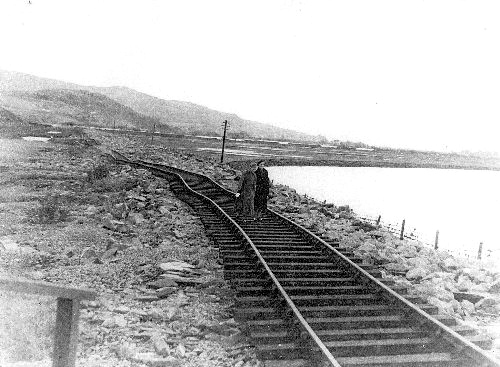As the people of Ardudwy know as well as people in the U.S. of America who have seen it raining frogs before now, wind and water are a powerful combination. Certainly the people of Ardudwy have a right to continue talking about the storms of 1927, 1938 and 1939 as if they were important religious events. Every storm leaves its mark. Every storm comes and goes. But let us turn our sights to the storm on Friday night, October 28th 1927, and focus this time on various reports in the newspapers of the time.
Great Tide 1938
Snippets from the Press - "Y Genedl Gymreig" The Maentwrog valley was like a sea until the middle of the week. . . The fields beside the road were like a sea and there were many hundreds of acres of land under water. . . . Trees had fallen everywhere, crushing the electric wires along the road.
Talsarnau: Until Thursday transport was impossible to Talsarnau from Penrhyn apart from on foot. The storm and the tide had destroyed the road near the powder works.
The Railway: The rails have been thrown aside for about 10 yards, and are looped like a snake. The bed of the railroad has been broken up, or in some places carried away. On the level part of road after passing Capel Brontecwyn, several officials and other men were busy gathering together the bodies of drowned animals to burn. There was a large pile of them - sheep, pigs, cattle and horses along the road and on the marshland there were tens of hay bales and corn that had been spoiled, many had been broken up, and others had been carried and left by the tide elsewhere.
Yr Herald Gymraeg, 1927 At Yr Ynys the force of the water had caused terrible havoc on the roads, and had worked its way to several houses and caused a huge loss in property. . .
Dyffryn: Two oak trees are described falling on the Comrades' Club with seven members inside. Only by the skin of their teeth were the seven of them able to escape through a door at the side of the cabin. A number of trees were uprooted and many houses were damaged. Damage was done to the line of the G.W.R.
Llanaber: The waves were seen flowing over the train and after the 7.15p.m. train passed the railway was raised for three quarters of a mile and dropped 18 feet in the nearby fields. Hundreds of sheep, cattle and pigs were drowned.
Damage of £500 to the Barmouth Promenade: The streets and houses in Barmouth were under water, and furniture was destroyed. Large stones and debris were left on the prom. Two shelters were swept away by the flow. Damage of £1000 was done to the breakwaters of Ynys Bermo. the water flowed into the boilers of the Gas Works, and the town was in darkness for two days. In the services of the churches and chapels candles and lamps were lit rather than using gas. The Tennis Club pavilion was awash with the water for 200 yards.
Harlech: The storm's damage was such that it was thought that no stock would come to the Mart on Wednesday, but in spite of everything there were about 30 cows and a few sheep and pigs. There was a better sale than expected, and all were cleared almost without exception. . . Passengers on the train towards Bermo and Harlech had to stay the night in Penrhyndeudraeth.
What was amazing at that time, and even to this day, is that no human life was lost in the tempest.



